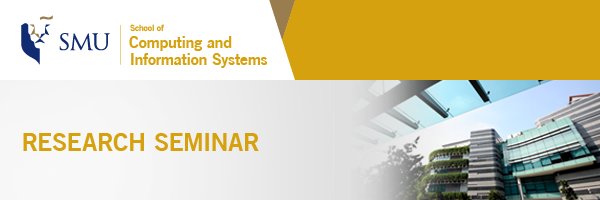| |
 VeRe: Verification-Guided Synthesis for Repairing Deep Neural Networks Speaker (s):

Jingyi Wang
Assistant Professor,
IS2 Lab (Intelligent System Security),
Zhejiang University
| Date: Time: Venue: | | 12 February 2025, Wednesday 10:30am – 11:30am School of Computing &
Information Systems 2 (SCIS 2)
Level 4, Seminar Room 4-2
Singapore Management University
90 Stamford Road,
Singapore 178903 Please register by 11 February 2025. We look forward to seeing you at this research seminar.  |
|
About the Talk Neural networks have achieved significant success in many domains. However, before deployment in safety-critical systems, neural networks must undergo rigorous validation to ensure reliable decision-making under all operational and even adversarial conditions (e.g., presence of backdoor attacks). Furthermore, there is a need to repair the neural networks to satisfy these needs when they do not. In this talk, I will introduce VeRe, a formal verification-based neural network repair technique, which performs verification-guided targeted repair on neural networks that fail to satisfy specified properties (e.g., safety requirements, absence of backdoors). Specifically, VeRe performs fault localization based on linear relaxation to symbolically calculate the repair significance of neurons and furthermore optimize the parameters of problematic neurons to repair erroneous behaviors. VeRe is evaluated on various repair tasks. For the task of removing backdoors, VeRe successfully reduces attack success rate from 98.47% to 0.38% on average, while causing an average performance drop of 0.9%. For the task of repairing safety properties, VeRe successfully repairs all the 36 safety properties and achieves 99.87% generalization on average. About the Speaker Jingyi Wang is an Assistant Professor (under “100 Talents Program”) at Zhejiang University, China. He received his Ph.D. from the Singapore University of Technology and Design and was a research fellow at the National University of Singapore. His research focuses on software engineering for artificial intelligence (SE4AI) and formal methods applied to security. His work has been published in top-tier venues such as S&P, CCS, ICSE, ISSTA, FM, and TACAS. He received the ACM SIGSOFT Distinguished Paper Award twice (ICSE 2018 and ICSE 2020) and was selected as ACM SIGSOFT Research Highlights. Currently, he serves as the PC Co-chair of ICFEM 2025, the PC member of ACM CCS, ICSE, ISSTA, and WWW, etc. |